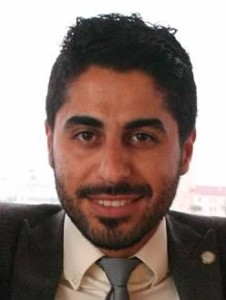Moving beyond tragedy into a peaceful future
In August of 2014, catastrophe struck during Hadeer Basheer’s last summer holiday before his final year at the American University of Iraq at Sulaimani (AUIS) in northern Iraq where he was studying to become a mechanical engineer and one of the top ten students. Still in the city of Sulaimani that August, Hadeer had worked since June as a summer intern at Korek Engineering Systems, learning about sophisticated mechanisms—such as remote telemetry terminal units that gather and control data for sizable geographic areas alongside programmable logic control centers that use local data for assembly lines or building management. The many software programs related to this field fascinated Hadeer, but he was gravely worried.
ISIS had warned people throughout the region that they had five days to convert to Islam or die, and they were approaching Hadeer’s hometown of Bashiqaa, northeast of Mosul. Bashiqaa should have been a model for the kind of peaceful coexistence possible throughout all of Iraq. Though Hadeer and his family belong to a four-thousand-year-old religion (its name, Yezidi, simply means deity-worshippers), they never experienced persecution in Bashiqaa. The Yezidis respect all religions and pray for others before themselves, Hadeer says. “I never heard of a Muslim person in conflict with a Yezidi, an Arab with a Kurd, a Sunni with a Shiite in Bashiqaa.”
He quickly finished his internship with a letter of commendation and rushed home to accompany his family, planning an escape to Turkey if necessary. He worked briefly for his professor, Director of the Institute for Regional and International Studies (IRIS), at AUIS and a journalist with the Iraq Oil Report, a leading source of news and analysis in Iraq. Hadeer researched and reported ongoing events in Bashiqaa and the situation among the Yezidi community as they fled their homes or fought ISIS on the mountain.
On the terrible day Hadeer’s family escaped, hundreds of phone calls came in from all around the country, especially from Hadeer’s friends in Sulaimani, offering their homes as a haven. “They were always there to help if we needed anything,” he says. Constantly keeping passports nearby, they’d found shelter somewhere in Kurdistan—which can include southeastern Turkey, eastern Syria, and western Iran, as well as the independently governed area of northern Iraq. Hadeer and his family were horror-stricken to learn of 2,000 girls and women, mostly Yezidis, forced to watch the genocidal executions of their sons, husbands, brothers, and fathers before being kidnapped and sold among ISIS members. 600,000 people were displaced with about half that number forced to live in camps. The Director of IRIS/AUIS said that Hadeer interviewed leaders and locals from his community, using his unique position (as an English-speaking Yezidi from an ISIS-controlled area) to advocate for his people.
Hadeer wonders how genocide can happen to people who simply respect others’ religions and wish the best for everyone. “I haven’t faced peace in my country since I was born,” he says, “I really want to literally see how and why other countries have peace and we don’t.” He misses his home and his Bashiqaa, but he knows that rage won’t bring them back or the kidnapped young women or those who have lost their lives.
“I don’t want to live with anger in my heart,” Hadeer says. “What happened to us is beyond the level of thinking to take revenge. If we don’t clear our hearts, we will live the rest of our lives miserably. I will never forget what happened on August 3rd, 2014, but I want to forget the hardest parts of that day.”
The Peshmerga and other forces managed to keep ISIS out of Iraqi Kurdistan, and life went on. Originally, Hadeer had been fortunate to receive a scholarship to AUIS, and the fall semester was about to start. Hadeer didn’t want to leave his family in their dependent situation, but the goal of graduating soon and finding a job would enable him to help them more than if he quit. He traveled hundreds of miles from where they were staying to return to Sulaimani and his normal academic routine. It takes courage not only to persevere, but to become a leader as well, and Hadeer took on a leadership role in planning a vitally important career day, a yearly event held in Erbil. His team managed logistics professionally and served as a liaison between business executives, the event committee, and job-seekers.
A year after the disastrous summer of 2014, the Yezidis are scattered throughout Kurdistan, but the Kurdish people who have accommodated them have never complained, and Hadeer and his family are deeply grateful. Hadeer graduated and wants to make changes, but he says, “I want to be an engineer in my country, as far as my country is able to make sure I don’t get killed or kidnapped any minute for no reason.”
One of his instructors wrote, “As a Yezidi, Hadeer has faced adversity time and time again but always keeps spirits up with a good attitude and sense of humor.” He added that, despite everything, Hadeer has no interest in any long-term stay abroad because he loves his community and his country and is committed to making it a better place. He still thinks of Bashiqaa that was once a place of peaceful coexistence.

